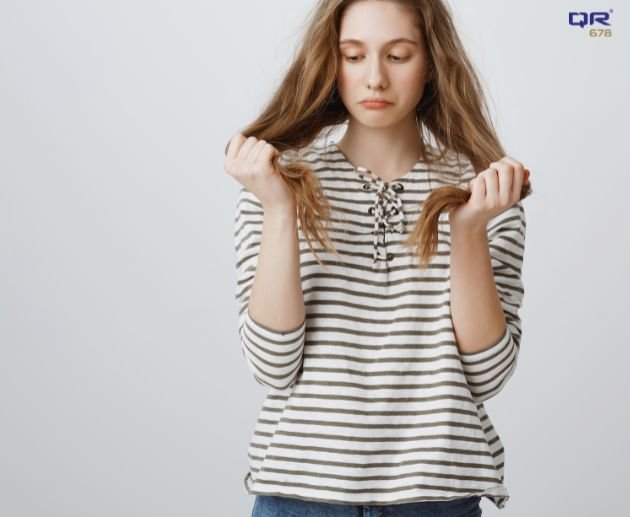Can Hair Loss Due to Thyroid Grow Back?

Hair loss can be confusing. When it starts without warning and does not stop, it raises questions. If you have a thyroid condition and your hair is falling out, you are likely wondering if it will ever grow back.
The truth is, thyroid-related hair loss can often be reversed. But to get there, you need to understand what is causing the problem and how your body heals once the root issue is treated.
Let us look at how the thyroid affects hair, what to expect during recovery, and how you can support your hair while your body returns to balance.
Also Read: can hair loss from dehydration be reversed
The Link Between Thyroid and Hair
The thyroid is a small gland located at the front of your neck. It produces hormones that help regulate the way your body uses energy. These hormones affect everything from your heartbeat to how your skin and hair function.
When the thyroid is overactive or underactive, your body falls out of rhythm. In both cases, the balance that keeps your hair growing steadily is disturbed. The hair cycle slows down, and strands either stop growing or start falling out too soon.
Hair loss caused by thyroid issues does not happen overnight. It is usually slow, but it can become noticeable within a few months. Some people lose hair evenly all over the scalp, while others see thinning near the temples or crown.
Will the Hair Grow Back?
In most cases, yes. Once the thyroid hormone levels return to normal, the hair cycle begins to repair itself. But this does not happen instantly. Hair takes time to regrow. Even after the internal balance is fixed, visible recovery may take months.
The key is to address the thyroid problem properly. Once the body stops being under stress, it can focus on repair. Hair is one of the last parts of the body to receive attention during illness, so you need to be patient.
Also Read: does cod liver oil promote hair growth
What Slows Recovery?
Several things can affect how fast your hair grows back. If your thyroid condition has gone untreated for a long time, recovery may take longer. The same is true if you are low in nutrients like iron, zinc, or vitamin D.
Age also plays a role. Younger people tend to bounce back faster. If you are older or have other health issues, the hair might grow slower or in a different pattern.
Poor diet, high stress, and lack of sleep can delay recovery, even if you are taking thyroid medicine. That is why you need a full care plan, not just pills.
What to Expect When Regrowth Starts
When your body starts healing, the first sign is a drop in daily hair fall. You may notice fewer strands on your pillow or in the drain. After that, tiny baby hairs might start to grow near the hairline or parting.
At first, this new hair may feel soft, thin, or look different from the rest of your hair. That is normal. Over time, these strands get stronger. But it may take up to 6 months before you see a noticeable difference in volume.
Most people regain what they lost, but it depends on how early the thyroid was treated and how consistent your care is.
What You Can Do to Help
While your medicine handles the hormone levels, you can support the process in other ways. These steps are simple, but they work when done regularly.
1: Eat whole foods: Your hair needs protein, iron, zinc, and healthy fats. Include leafy greens, lentils, nuts, eggs, and seeds in your meals.
2: Drink enough water: Dehydration can slow down hair repair. Keep your body hydrated so nutrients can travel well.
3: Sleep on time: Rest is the time when your body repairs itself. Aim for at least 7 hours each night.
4: Keep your scalp clean: Use mild shampoos and avoid products that cause buildup.
5: Be gentle: Avoid harsh brushing or tight hairstyles. Let your scalp breathe.
Also Read: does calcium magnesium and zinc help hair growth
Do You Need Supplements?
Supplements can help if your blood reports show you are low in key nutrients. Iron, vitamin D, and B12 are often low in people with thyroid issues. If your doctor suggests supplements, follow the dose exactly.
Avoid self-medicating. Taking too much can be harmful. Focus on food first. Supplements should only fill the gaps that food cannot.
Will Hair Texture Change?
Yes, it might. Some people notice their hair becomes curlier, straighter, or finer after thyroid treatment. Others say it feels drier or takes longer to grow. These changes are normal and usually settle down in time.
The hair you grow after recovery may not match what you had before in every way. But it will still be healthy if the root cause is treated well.
When to See a Specialist
If you have been taking your thyroid medicine regularly and still do not see any improvement in six months, speak with your doctor. They may check your hormone levels again or test for other issues like autoimmune conditions, poor absorption of medicine, or chronic nutrient deficiencies.
Hair loss can have more than one cause. It is possible to have thyroid-related hair fall along with other problems, like anemia or high stress.
Final Thoughts
Hair loss from thyroid imbalance can be reversed, but it requires time and the right approach. Once your thyroid levels are back to normal and your body feels supported, your hair will begin to recover too.
Be patient with your hair and kind to your body during this time. Support your health through good food, rest, and gentle care. The changes will come quietly, steadily, and strand by strand.